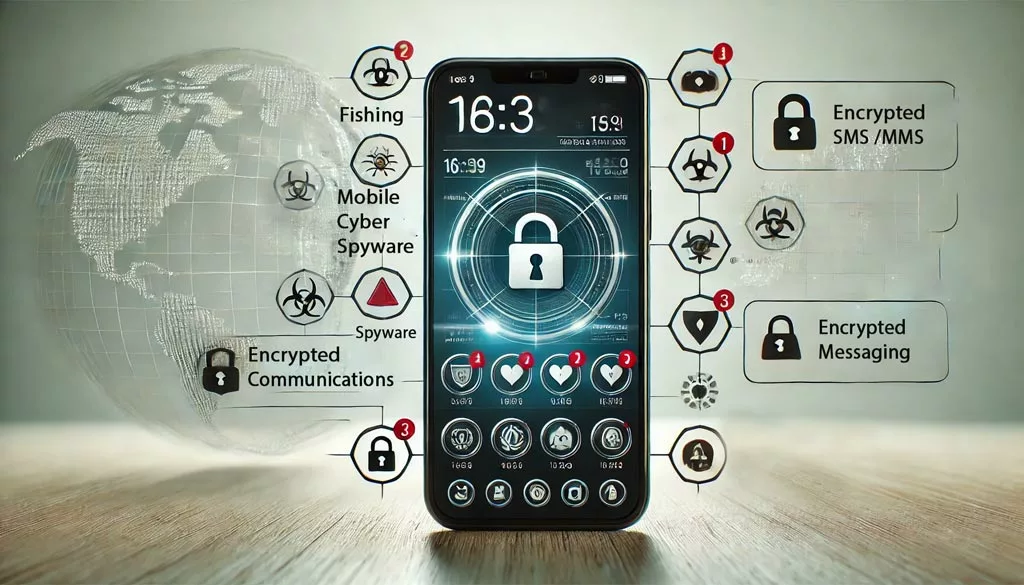Mobile Cyber Threats in Government Agencies by Jacques Gascuel: This subject will be updated with any new information on mobile cyber threats and secure communication solutions for government agencies. Readers are encouraged to leave comments or contact the author with suggestions or additions.
Protecting Government Mobile Communications Against Cyber Threats like Salt Typhoon
Mobile Cyber Threats like Salt Typhoon are increasingly targeting government agencies, putting sensitive data at risk. This article explores the rising risks for mobile security and explains how DataShielder NFC HSM offers a robust, anonymous encryption solution to protect government communications and combat emerging cyber threats.
US Gov Agency Urges Employees to Limit Mobile Use Amid Growing Cyber Threats
Reports indicate that the U.S. government’s Consumer Financial Protection Bureau (CFPB) has directed its employees to minimize the use of cellphones for work-related activities. This advisory follows recent cyber threats, particularly the “Salt Typhoon” attack, allegedly conducted by Chinese hackers. Although no direct threat to the CFPB has been confirmed, this recommendation highlights vulnerabilities in mobile communication channels and the urgent need for federal agencies to prioritize secure communication methods. For more details, you can refer to the original article from The Wall Street Journal: (wsj.com).
Mobile Cyber Threats: A Growing Risk for Government Institutions
Cyberattacks targeting government employees’ smartphones and tablets are rising, with mobile devices providing a direct gateway to sensitive information. The Salt Typhoon attack serves as a recent example of these risks, but various other espionage campaigns also target mobile vulnerabilities in government settings. Given these threats, the CFPB is now advising employees to limit mobile use and to prioritize more secure platforms for communication.
Focus on Government Employees as Cyberattack Targets
Government employees, especially those with access to confidential data, are prime targets for cybercriminals. These individuals often handle sensitive information, making their devices and accounts particularly appealing. Attacks like Salt Typhoon seek to access:
- Login Credentials: Stolen credentials can provide direct access to restricted databases and communication channels, leading to potentially devastating breaches.
- Location Data: Tracking government employees’ locations in real-time offers strategic information about operations and movements, which is especially valuable for foreign intelligence.
- Sensitive Communications: Intercepting messages between government employees can expose classified information, disrupt operations, or provide insight into internal discussions.
Past cases demonstrate the real-world impact of such cyberattacks. For instance, a 2015 breach targeted the U.S. Office of Personnel Management (OPM), compromising personal information of over 20 million current and former federal employees. This breach revealed details such as employees’ job histories, fingerprints, and social security numbers, underscoring the security risks government personnel face.
Key Cyber Threats Facing Mobile Devices
- Phishing and Mobile Scams: Cybercriminals increasingly use SMS phishing (smishing) and other tactics to lure government employees into revealing sensitive information or unknowingly installing spyware.
- Spyware and Malicious Apps: Tools like Pegasus spyware have demonstrated the capability to access private calls, messages, and even activate cameras and microphones to monitor private communications.
- Exploiting System Flaws and Zero-Day Vulnerabilities: Hackers exploit unpatched vulnerabilities in operating systems to covertly install malware on devices.
- Network Attacks and IMSI Catchers: Fake cell towers (IMSI catchers) allow cybercriminals to intercept calls and messages near the target, compromising sensitive information.
- Bluetooth and Wi-Fi Interception: Public Wi-Fi and Bluetooth connections are particularly vulnerable to interception, especially in public or shared spaces, where attackers can access devices.
Notorious Spyware Threats: Pegasus and Predator
Beyond targeted cyberattacks like Salt Typhoon, sophisticated spyware such as Pegasus and Predator pose severe threats to government agencies and individuals responsible for sensitive information. These advanced spyware tools enable covert surveillance, allowing attackers to intercept valuable data without detection.
- Pegasus: This spyware is one of the most powerful and notorious tools globally, widely known for its capabilities to infiltrate smartphones and monitor high-stakes targets. Pegasus can access calls, messages, and even activate the camera and microphone of infected devices, making it a potent tool in espionage. Learn more about Pegasus’s extensive reach and impact in our in-depth article: Pegasus – The Cost of Spying with One of the Most Powerful Spyware in the World.
- Predator: Like Pegasus, Predator has been employed in covert surveillance campaigns that threaten both governmental and private sector security. This spyware can capture and exfiltrate data, offering attackers a silent but powerful tool for gathering sensitive information. To understand the risks associated with Predator, visit our detailed guide: Predator Files Spyware.
These examples underscore the urgent need for robust encryption solutions. Spyware like Pegasus and Predator make it clear that advanced security tools, such as DataShielder NFC HSM, are essential. DataShielder offers an anonymous, fully encrypted communication platform that protects against sophisticated surveillance, ensuring that sensitive data remains secure and beyond reach.
Impacts on National Security and the Role of Cybersecurity
Cybersecurity failures in government agencies can have serious national security repercussions. The potential consequences underscore the importance of cybersecurity for sensitive government communications.
- Repercussions of a Security Breach: A security breach within a government agency can lead to the disclosure of confidential information, impact diplomatic relations, or even compromise critical negotiations. In some cases, such breaches can disrupt operations or expose weaknesses within government structures. A major breach could also undermine the public’s trust in the government’s ability to safeguard national interests.
- New Cybersecurity Standards and Policies: In response to increasing threats, federal agencies may adopt stricter policies. This can include expanded training programs for employees, emphasizing vigilance in detecting phishing attempts and other suspicious activity. Agencies may also implement policies restricting the use of personal devices for work tasks and investing in stronger security frameworks. By enforcing such policies, agencies aim to create a more resilient defense against sophisticated cyber threats.
Statistics: The Rise of Mobile Cyber Threats
Recent data highlights the scale of mobile cyber threats and the importance of robust security measures:
- Increase in Mobile Phishing Attacks: According to the National Institute of Standards and Technology (NIST), mobile phishing attacks rose by 85% between 2020 and 2022, with smishing campaigns increasingly targeting government employees to infiltrate networks. (NIST Source)
- Zero-Day Vulnerabilities: The National Security Agency (NSA) reports a 200% increase in zero-day vulnerability exploitation on mobile devices over the past five years. These flaws enable hackers to infiltrate devices undetected. (NSA Security Guidance)
- Spyware and Surveillance: The use of spyware for surveillance in government settings has tripled since 2019. Tools like Pegasus enable hackers to capture calls and messages, threatening confidentiality. (NIST Mobile Security)
- Centralized Device Management: NIST recommends centralized management of devices within agencies, securing both issued and personal devices. This approach reportedly reduced mobile security incidents by 65% in 2022.
- Financial Impact of Mobile Cyberattacks: According to Cybersecurity Ventures, mobile cyberattacks are expected to cost organizations around $1.5 billion per year by 2025, covering data repair, breach management, and information loss.
Security Guidelines from the NSA and NIST
To address these threats, agencies like the NSA and NIST recommend critical security practices:
- NSA: Disabling Wi-Fi, Bluetooth, and location services when not in use reduces risks from vulnerable wireless connections. (NSA Security Guidance)
- NSA – Securing Wireless Devices in Public Settings: This guide explains how to identify risky public connections and secure devices in public spaces.
- NIST: NIST suggests centralized device management and enforces regular security updates for work and personal devices used in agencies. (NIST Mobile Security Guide)
DataShielder NFC HSM: A Comprehensive Solution for Secure, Anonymous Communication
In response to escalating mobile cyber threats, government agencies are prioritizing more secure communication methods. Traditional security measures often rely on servers or cloud storage, which can be vulnerable to interception or data breaches. DataShielder NFC HSM provides a breakthrough solution tailored specifically to meet the stringent security and privacy needs of sensitive government communications.
DataShielder NFC HSM Products for Android Devices
- DataShielder NFC HSM Master: Provides robust encryption for emails, files, and secure communications on mobile and desktop platforms, protecting against brute force attacks and espionage.
- DataShielder NFC HSM Lite: Offers essential encryption capabilities for secure communications, balancing security and usability.
- DataShielder NFC HSM Auth: Prevents identity theft and AI-assisted fraud, offering secure, anonymous authentication.
- DataShielder NFC HSM M-Auth: Designed for secure authentication in mobile environments, keeping mobile communications protected in less secure networks.
Enhanced Security for Sovereign Communications: DataShielder NFC HSM Defense
The DataShielder NFC HSM Defense version enables secure phone calls where contacts are stored solely within the NFC HSM, ensuring no traces of call logs, SMS, MMS, or RCS remain on the device after use. This feature is invaluable for agencies handling highly confidential information.








